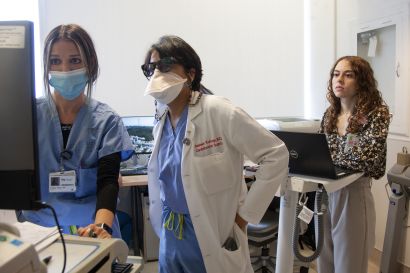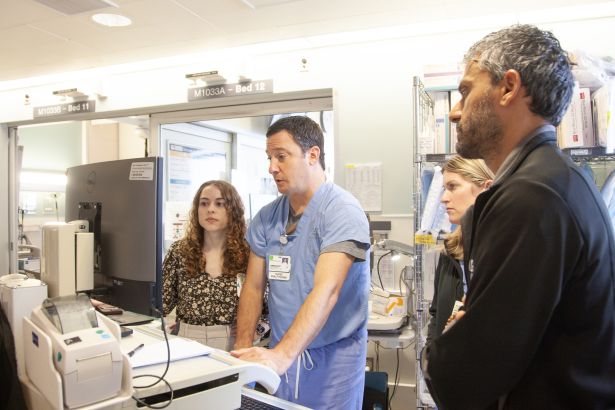- About
- Organization
- Organization Overview
- Dean’s Office
- Department of Bioengineering and Therapeutic Sciences
- Department of Clinical Pharmacy
- Department of Pharmaceutical Chemistry
- Quantitative Biosciences Institute
- Org Chart
- Research
- Education
- Patient Care
- People
- News
- Events
Alumni Spotlight: Clinical Practice and Public Health Come Together for Transplant Pharmacist
By Suzan Revah / Wed Sep 25, 2024
For organ transplant pharmacist Rachael Gordon, PharmD 2022, MPH, the path to pharmacy was longer and different than most.
After completing her master’s degree in public health and working as a research coordinator at the University of Southern California, a clinical pharmacist specializing in HIV piqued her interest and inspired her to apply to pharmacy school.
She knew she found the right fit for her unique background when she did a liver transplant rotation with David Quan, PharmD, a specialized transplant pharmacist at UCSF Medical Center, as part of the PharmD program’s experiential learning.
“I initially thought I’d pursue infectious diseases,” Gordon said. “But transplant pharmacy is all-encompassing—you’re involved in intensive care unit (ICU) rounds, patient teaching, discharge and long-term outpatient care. It’s incredibly rewarding to connect with patients at such a critical point in their lives.”
At UCSF Health, Gordon is a critical member of the transplant patient care team. Her role includes recognizing drug interactions, as well as monitoring and managing toxicities of immunosuppressants, antimicrobials and other essential post-transplant medications.
Research in practice
Gordon’s background in statistics and analysis has helped her extend her role beyond the clinical, informing research that she hopes will lead to a broader understanding of transplant medicine for specific organs.
One project she is working on analyzes the impact of crushing a medication before giving it to patients. “We noticed the dose wasn’t right; we changed it. Then we looked at the data, and now we are hoping to publish,” Gordon said.
Another potential research project Gordon is exploring involves whether more patient-specific dosing can be based on genomics. Gordon said the lack of extensive data sets in transplant medicine often necessitates extrapolating data from one type of organ to another. “My public health skills are invaluable,” she said.
A multidisciplinary approach

Gordon attends morning rounds with Jasleen Kukreja, MD, MPH, center, and nurse Ashley Taylor in the Cardiac Critical Care Unit at UCSF Helen Diller Medical Center at Parnassus Heights.
During her residency at UCSF, Gordon rotated through several organ-specific transplant programs, including kidney, pancreas, liver, heart and lung—pediatric and adult patients alike. She said the breadth of that experience and the number of cases she is directly involved in today has given her perspective on how far-reaching a pharmacist’s role can be.
“You get to experience what a pharmacist can do when they're working at the top of their license, and it’s very collaborative. We do multidisciplinary rounds, on teams that include nurse practitioners, registered nurses, case managers and social workers,” she said. “And we’re not just verifying orders all day. Surgeons and nurse practitioners are asking us questions to determine the best treatment, and pharmacy is well-respected within the organization. They care about what we have to say.”
Gordon says being part of cross-functional teams has given her confidence to pursue research amid a demanding transplant schedule where she has seen the number of transplants expand exponentially in recent years.
She added that being in both the ICU and the clinic with patients gives her role continuity that she describes as full-circle learning. “You’re not just doing transplant drugs. We do discharge teaching, and we get into diabetes meds, blood pressure meds and infectious diseases,” she said. “You’re explaining drug interactions, and you’re showing interns. You’re training the future to look to their pharmacists as references and guides.”

Gordon, far left, consults with nurse practitioners David Gordon, Brianna Zuckerman and Gautham Iyer, from center.
Tags
Category:
Sites:
School of Pharmacy, PharmD Degree Program
About the School: The UCSF School of Pharmacy aims to solve the most pressing health care problems and strives to ensure that each patient receives the safest, most effective treatments. Our discoveries seed the development of novel therapies, and our researchers consistently lead the nation in NIH funding. The School’s doctor of pharmacy (PharmD) degree program, with its unique emphasis on scientific thinking, prepares students to be critical thinkers and leaders in their field.





